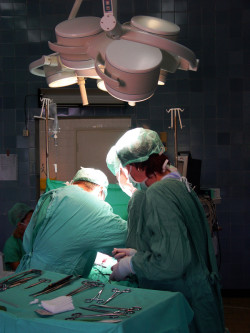Top Class Actions’s website and social media posts use affiliate links. If you make a purchase using such links, we may receive a commission, but it will not result in any additional charges to you. Please review our Affiliate Link Disclosure for more information.
A new morcellation cancer lawsuit has joined the phalanx of lawsuits against the makers of power morcellators. In this case, Plaintiff Denise W. of Michigan alleges that surgery with a power morcellator gave her Stage 4 bone and breast cancer.
Power morcellators are a type of surgical tool used in laparoscopic surgeries. In this type of surgery, surgeons use small, specialized tools to perform the bulk of the surgery within the patient’s body. This allows surgeons to cut through less of a patient’s healthy tissue, making the procedure less of a burden on the body. This makes laparoscopic surgery a viable option for patients who have risk factors that make surgery dangerous.
The one downside to laparoscopic surgery is that in some surgeries, like hysterectomies, surgeons have to remove tissue and organs that are larger than the small incisions used. To work around this, power morcellators are used to cut tissue into smaller pieces. However, thousands of reports have emerged which indicate possible serious drawbacks to power morcellators, including morcellation-induced cancer.
The FDA has received numerous reports, and issued a series of increasingly serious warnings, that power morcellators may spread or “upstage” cancer. One of the main reasons for a robotic hysterectomy is for the removal of benign tumors called uterine fibroids. However, by some FDA estimates, as many as one in 300 uterine fibroids also contain malignant cancer cells. In an old-fashioned hysterectomy, this would not cause a problem. However, when a power morcellator cuts through uterine tissue, it could theoretically spread these cells around the body. How widespread cancer cells are in the body is a major indicator of how serious cancer is—and how hard it is to treat. The process of spreading cancer through the body is called “upstaging,” since the severity of cancer is measured in stages.
According to the text of her morcellation cancer lawsuit, Denise had a robotic hysterectomy (a type of laparoscopic surgery using a power morcellator) in June of 2011. In 2014, it was discovered that she had Stage 4 cancer in her bones and breasts. Stage 4 is the most advanced stage of cancer, and indicates that cancer cells exist throughout the body. Stage 4 cancer typically has very poor outcomes.
The morcellation cancer lawsuit details brutal medical procedures facing Denise. She has found herself facing a grueling regimen of invasive medical procedures to try and control her advanced-stage cancer. This includes getting multiple rounds of radiation therapy, with each round lasting 10 weeks. She also must endure frequent injections of powerful medication to try and keep the cancer at bay.
Denise’s morcellation cancer lawsuit alleges that the advanced stage of her cancer was the result of power morcellators. This morcellation cancer lawsuit seeks to recoup the costs of her medical care, compensation for pain and suffering, and other costs related to the alleged morcellation cancer.
The Morcellation Cancer Lawsuit is Case No. 10352, in the U.S. District Court for the Eastern District of Michigan.
Do YOU have a legal claim? Fill out the form on this page now for a free, immediate, and confidential case evaluation. The morcellation cancer attorneys who work with Top Class Actions will contact you if you qualify to let you know if an individual lawsuit or class action lawsuit is best for you. [In general, morcellator cancer lawsuits are filed individually by each plaintiff and are not class actions.] Hurry — statutes of limitations may apply.
ATTORNEY ADVERTISING
Top Class Actions is a Proud Member of the American Bar Association
LEGAL INFORMATION IS NOT LEGAL ADVICE
Top Class Actions Legal Statement
©2008 – 2024 Top Class Actions® LLC
Various Trademarks held by their respective owners
This website is not intended for viewing or usage by European Union citizens.
Get Help – It’s Free
Join a Free Morcellation Cancer Class Action Lawsuit Investigation
If you or a loved one were diagnosed with cancer in the uterus, pelvis or abdomen within two years of undergoing surgery for a myomectomy (removal of fibroids), hysterectomy (removal of the uterus), oophorectomy (removal of the ovaries), or salpingectomy (removal of fallopian tubes), you may have a legal claim. See if you qualify by filling out the short form below.
An attorney will contact you if you qualify to discuss the details of your potential case at no charge to you.
Oops! We could not locate your form.













